Historic Contract Tentative Agreement Reached!
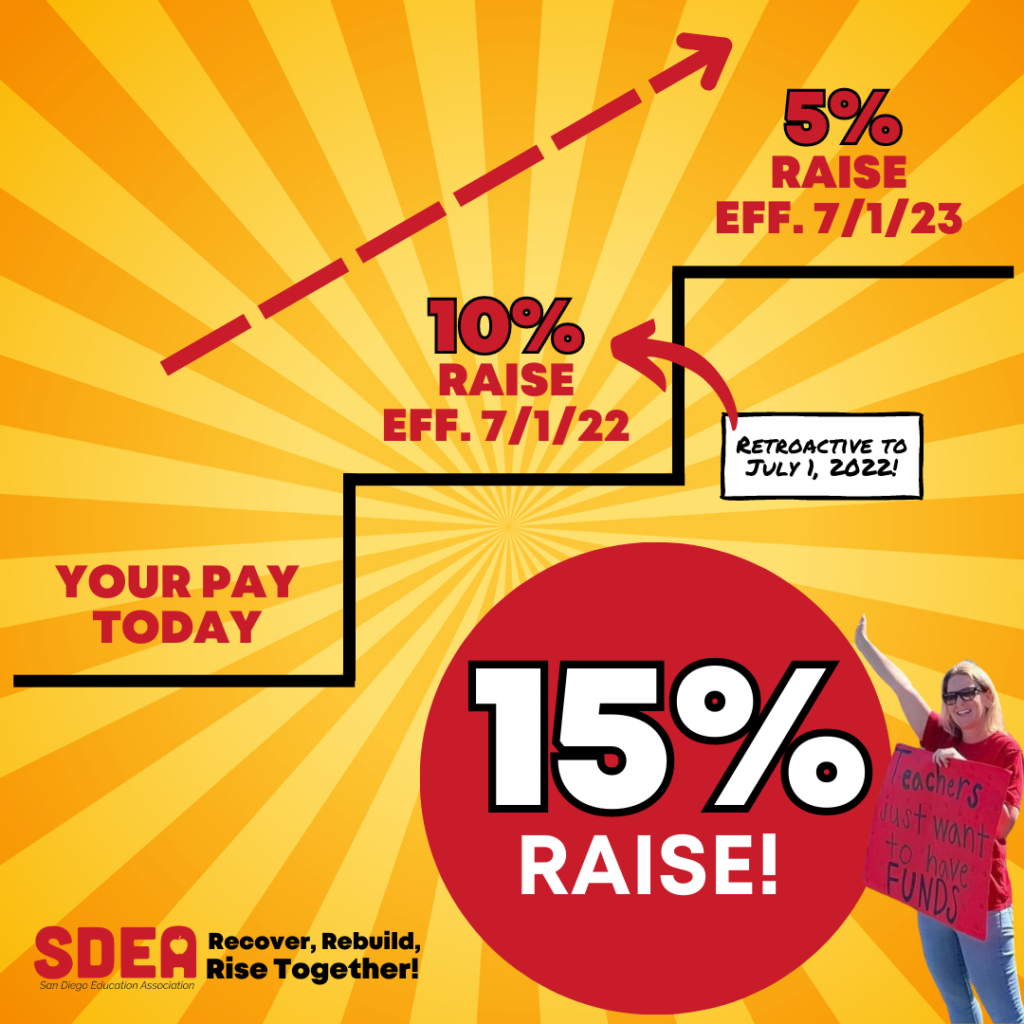
Our Recover, Rebuild, Rise Together platform was developed by SDEA educators in partnership with students, parents, and community allies. Over a year ago, our SDEA Bargaining Team brought our proposals to SDUSD and began the collective bargaining process to win real improvements to our working conditions which are our students' learning conditions. It was the collective action and solidarity of union educators who picketed, rallied, and held our school board accountable to demand a fair contract that gave our team the power to achieve improvements in all areas of our platform. Together we are stronger!!
Last night your SDEA Bargaining Team reached a tentative agreement with the District for our 2022-2025 union contract containing historic wins in educator compensation and investments in additional resources for our classrooms, and students.
Throughout this contract campaign, SDEA members showed up loud and proud to advocate for the schools that our students deserve. Together, we’ve built stronger relationships in the community and demonstrated that we are willing to take to the streets to win for the families and students we serve and for our public schools. Our collective power moved the District after months of stalled negotiations and led us to a tentative agreement that our bargaining team is proud of and that represents real improvements for educators and our school communities. 10
To go into effect, the tentative agreement must be ratified by SDEA members and the SDUSD School Board. If you’re not a member, join now so that you can vote and help build a stronger union! NON MEMBERS ARE NOT ELIGIBLE TO VOTE.
The contract tentative agreement ratification window will be June 1 through June 8.
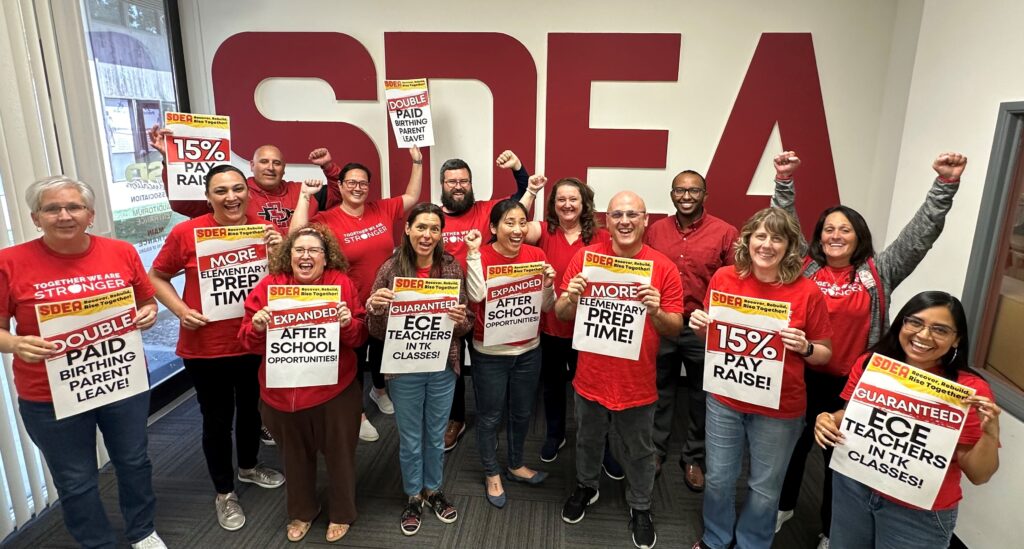
Highlights of our Tentative Agreement:
Historic 15% Pay Raise Over Two Years!
2022-2023: 10% raise, retroactive to July 1, 2022
2023-2024: 5% raise effective July 1, 2023 (compounded on top of the 10% salary increase for 22/23, resulting in a 15.5% increase!)
2024-2025: A wage reopener, meaning we go back to bargaining, to make further improvements in wages
This is a significant investment in educators. It’s the largest pay increase in our county (and possibly the entire state) and the largest in the history of SDEA. We won this historic raise while also protecting fully paid family healthcare! Including our 4.5% one-time retention bonus, this means our effective pay increase for 2022-2023 will be 14.5%. More competitive salaries will help hire educators and fill vacancies in hard to staff areas like nursing and special education!
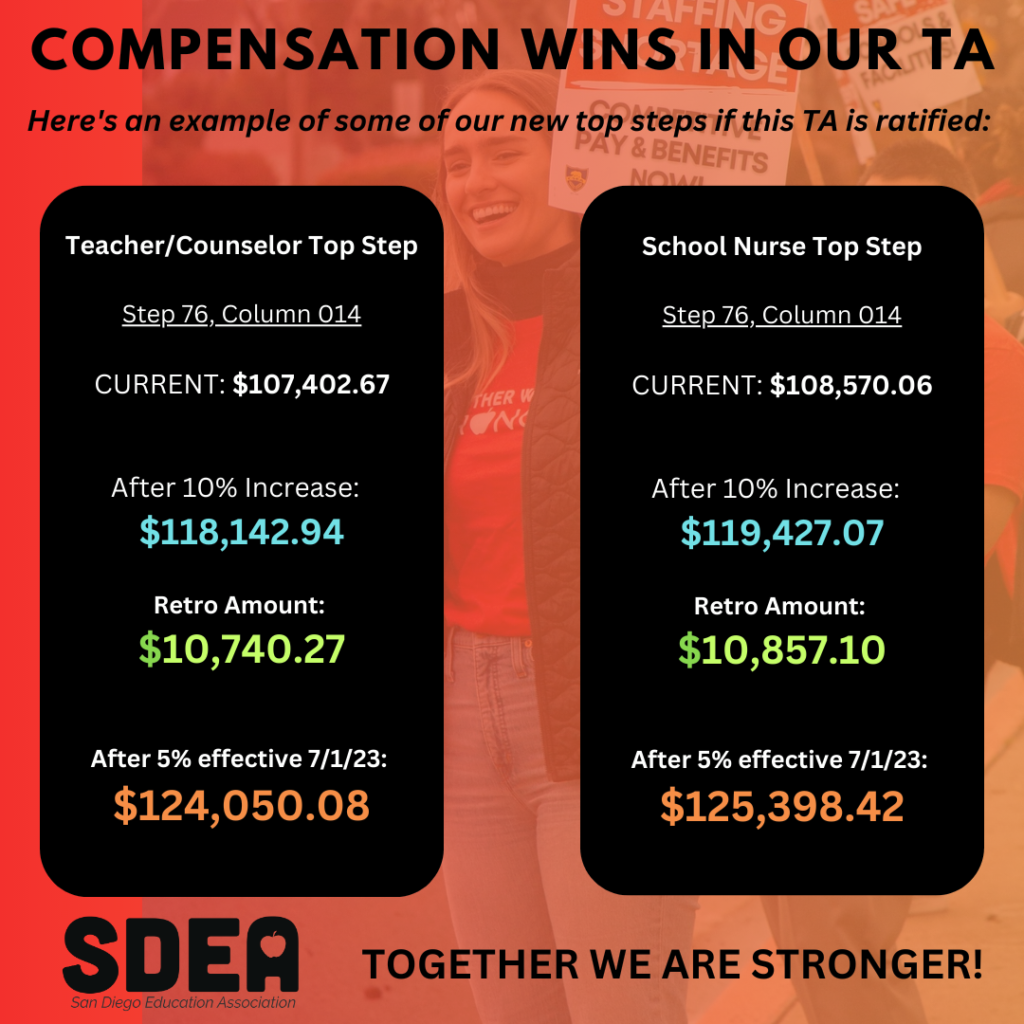
BIG WIN on Special Education & Private School Assessments!
Workload relief, PPPSS assessments re-centralized! The District will be creating a centralized team to address the PPPSS assessment needs. If the team reaches capacity for the amount of PPPSS assessments they can handle, the District will seek volunteer educators and/or retired educators to fill in. Volunteers will be compensated at their pro-rata rate to do this work! If there is still a need to meet the PPPSS assessment demands, the Joint Special Education Committee will then monitor and develop a plan for the completion of additional assessments.
Improvements to SLP salary rules that will now ensure veteran SLPs have all of their years of experience are appropriately credited.
Secondary Extended Day Units
We won an additional 1000 extended days units for 2023-2024, investing more than $1.3 million for SDEA members. In addition we came to an agreement with the District on Extended Day Units that will convene a committee to determine equitable compensation for secondary afterschool arts, athletic and academic work, including middle schools. This proposal would establish consistent extended day units across the District, and promote equity for the arts.
Early Childhood Special Education (ECSE)
The District agreed to convene a collaborative group to evaluate the service delivery model in the program. During the 2023-2024 school year, while that collaborative work is done, preparation time for ECSE classroom teachers will be provided by either an itinerant ECSE teacher, or a specially trained Visiting Teachers. These specially trained Visiting Teachers will be paid $300 per day for this work. This will provide sufficient staffing to ensure teachers receive their weekly prep time.
The ECSE Collaborative will have the authority, among other things, the ability to determine the weekly schedule for the 2024-25 school year and beyond.
Wins on Protecting Class Sizes and Nurse Staffing
The staffing allocation formulas for grades K-3 and 4-6 are protected in this agreement. The class average for grades K-3 will remain at 24, as it has been in previous years. In addition, we were able to lower the K-3 cap from 35 to 29. In situations where higher class sizes are a possibility, for example to avoid combos, site administrators are to collaborate with affected educators to make every effort to create classes no larger than 27. The cap for Grades 4-6 will remain at 35, with the goal of lowering that number in future successor bargaining.
Nurse Staffing Win: This agreement requires that every high school, and every elementary school with Medically and Physically Challenged classrooms MUST HAVE A FULL TIME NURSE. Strengthening shared decision-making within the nursing PGT and giving SDEA nurses a voice in the allocation of additional nurses beyond school sites while acknowledging that there are real school nurse staffing challenges in San Diego and across California.
Other Wins:
All comprehensive secondary, K8 and K12 schools would now have a new part-time position to support the implementation of effective Restorative Justice Practices.
A more detailed summary including all contract improvements will be sent to all members when we return to school on Tuesday!
Ratification Starts June 1
In-person voting at schools, programs, and at the SDEA office to ratify this tentative agreement on our new contract will begin on Thursday, June 1. Your amazing SDEA ARs/CRs will be attending a special Representative Council on Wednesday, May 31 to prepare for the ratification vote. Stay tuned for comprehensive details on every component of this historic tentative agreement!
Tentative Agreements
View all tentative agreements here.
Together We Are Stronger!
Kyle Weinberg, SDEA President, Mild/Moderate Ed Specialist, History and ELD Teacher; Teri Ang, Theatre Teacher, Mann MS; Sarah Darr, Senior SLP, Millennial Tech MS; Mary Gantz, School Nurse; Adam Goldstein, 4th/5th Grade Teacher, Hage El.; Stacy Hernandez, 2nd Grade Teacher, Dailard El.; Eri Nall, Counselor; Kiki Ochoa, History and Ethnic Studies Lead Teacher, Lincoln HS; Gale Petzrick, History Teacher, Clark MS; Angela Rieke, Ed. Specialist M/M, Cadman El. and Vista Grande El.; Lori Schmersal, PE Teacher & Coach, Clairemont HS; plus SDEA staff Abdul Sayid, Executive Director, and Sara Holerud, Organizer - with support from Christina Gallegos, ECSE Teacher, LMEC; Marjorie Treger, Theatre Resource Teacher, VAPA and Jonathon Mello, Organizer
Letters in Solidarity - SDEA union educators show up and show out!

SDEA Union Educators Show Up and Show Out!
In March, SDEA educators showed up and showed out. On March 8, over 140 SDEA site and program leaders convened in the SDEA union hall and felt the power of union solidarity. Our unity makes us stronger, inspires our collective action and propels positive change. This motivates us to persist in taking action to advocate for our fellow educators, our students, our profession and for public education.
After months of the District ignoring and disrespecting our bargaining demands, we mobilized again. The week of March 13-17, we picketed at over 140 schools. We demonstrated in support of our Recover, Rebuild and Rise Together platform in the rain. We showed up in all corners of San Diego for 5 days straight. We were joined by parents, students, media, community organizations and our CSEA union siblings. We stood together to demand a fair contract that prioritizes educators and the students we serve in the aftermath of the pandemic.
Our collective efforts are working. After hearing about SDEA’s plans to picket, the district made proposals on pay and elementary prep time. After 4,800 SDEA members took to the streets, the district made proposals on TK staffing and secondary PE class size. But we aren’t done fighting yet! The district said no to our demands to have a full-time counselor at every elementary school and a full-time nurse at every high school. They said no to our demand to lower class size in TK-5. They continue to ignore our demand for expanded parental leave.

In response, we must continue to demonstrate our resolve until the district uses its historic funding to pay educators a wage that allows us to live in the communities we teach in. The district’s funding for this school year and next school year is projected to increase by over 20%. While the SDEA has proposed an increase of 19.25%, the district is offering 9%. This disparity between the district’s funding and their proposals at the bargaining table is disrespectful to educators. And therefore, is it imperative to keep up the fight until we win working and learning conditions that attract and retain the highest quality educators in our district.
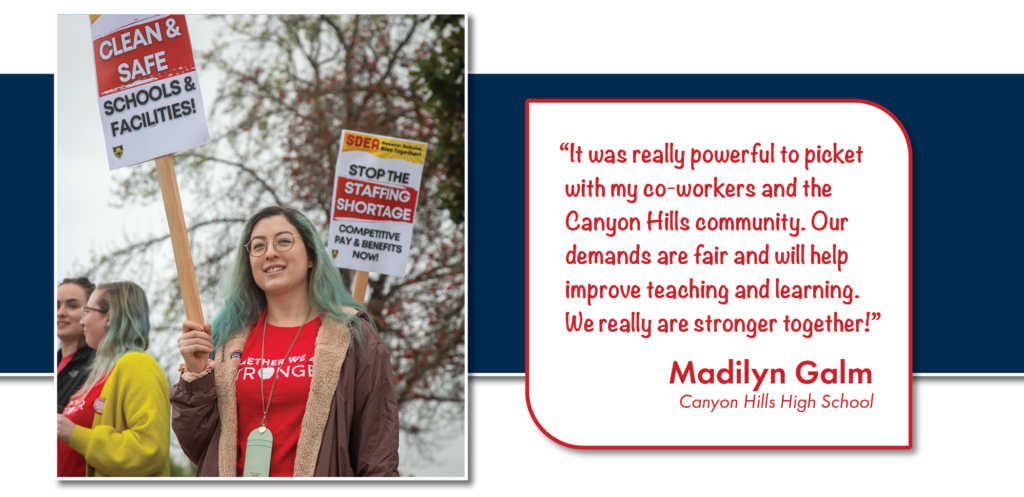
In April, we are showing up again. On April 18 and 19, SDEA members will be holding district leadership accountable to agree to a contract that will bring about the schools our students deserve. SDUSD Board Trustees will be in our union hall to listen to our feedback about the need to implement our bargaining platform. This is an opportunity for our elected school board trustees to hear how they can support educators and the students they were elected to represent. Register to attend one of the accountability sessions here. Let’s pack the auditorium and show the district that SDEA union educators are an organized hive that should not be taken lightly!
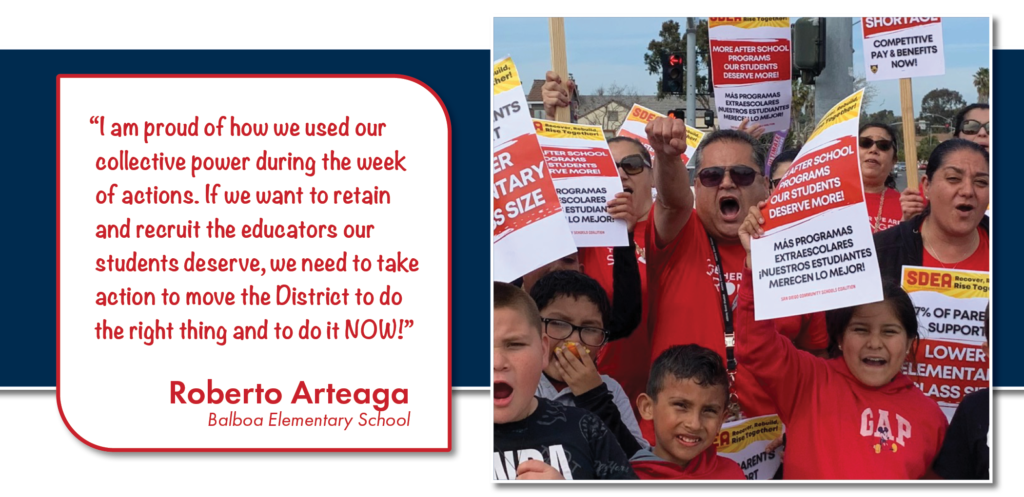

San Diego Community Schools Coalition Demands More After School Opportunities in San Diego Unified
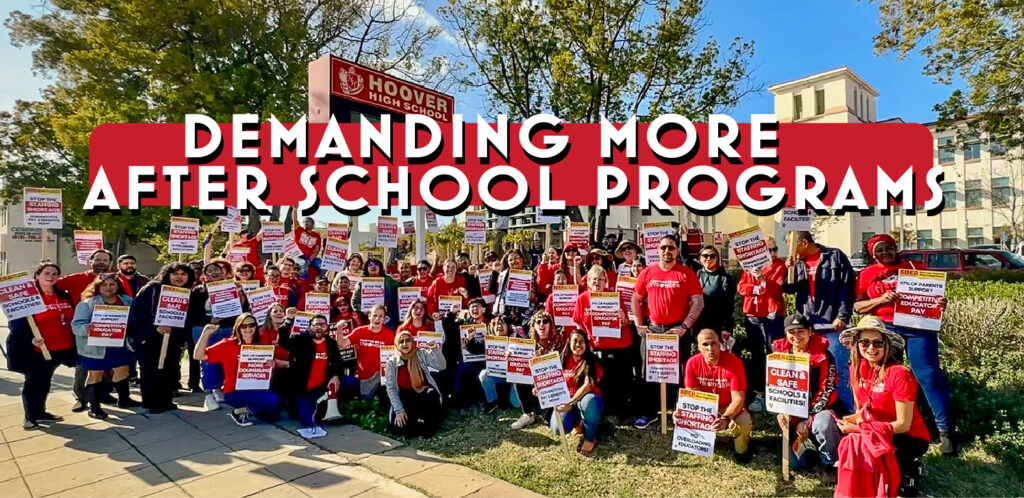
Parents, students, educators, and community members unite to create change at SDUSD through bargaining
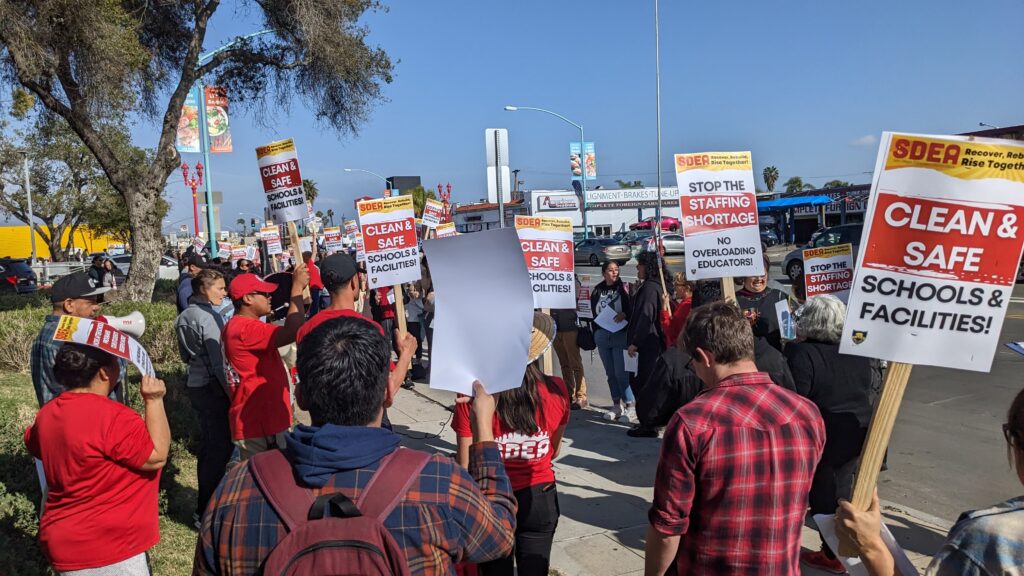
On Thursday, March 16th, Hoover High educators joined parents, students and other members of the San Diego Community Schools Coalition at a rally to demand fair pay, smaller class sizes, more counselors and more afterschool programs for students. The rally was part of a week of rolling pickets at over 140 schools to win our collectively developed Recover, Rebuild and Rise Together bargaining platform.
In February, the SDEA Bargaining Team, together with the San Diego Community Schools Coalition and SDUSD parents, presented our community demand proposal around expanded after school opportunities. This proposal, informed by parent input sessions, is a product of the relationship-building that SDEA members have engaged in during our contract campaign to win the schools our students deserve, including our presentations to parents and continuing with the picket week in March.
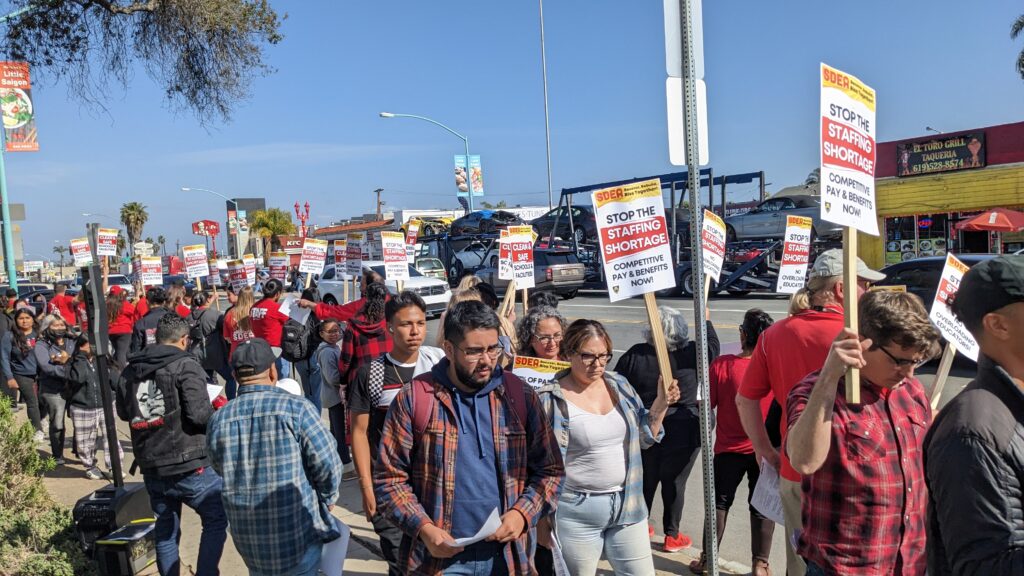
Parents told the San Diego Community Schools Coalition that the lack of access to affordable, culturally-sustaining afterschool programs is a significant problem in our district. They are standing up for their right to be actively involved in deciding what enrichment activities are offered in our schools. We have an opportunity as SDEA union educators to join parents in demanding education justice through Bargaining for the Common Good.
Bargaining for the Common Good is when unions partner with community organizations, parents and students to demand transformative changes that benefit the whole community. When union educators fight for students’ and community needs at the bargaining table, we can transform public education together. Across the country, Bargaining for the Common Good has resulted in new policies that help educators do our jobs better while improving outcomes for students, parents, and the overall community.
We need a process that leads to greater equity in designing and providing after school programming. Our after school opportunities bargaining proposal includes the following components:
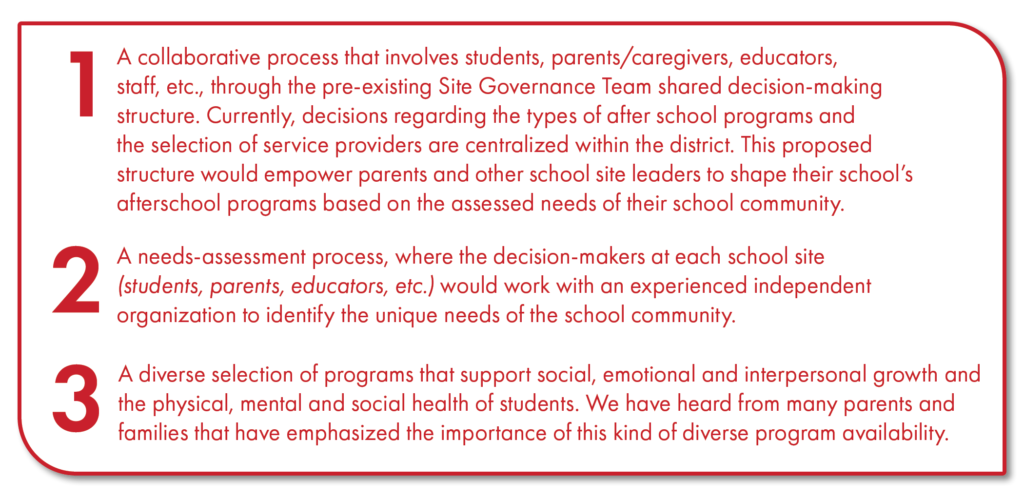
Our students deserve more!
Add your name to our pledge to show your support.
Contract Corner - Excessing

Involuntary Transfer (aka "Excessing")
Excessing = Reduction of Staff (Not layoff!)
Excessing is a type of involuntary transfer to achieve a reduction of staff due to declining enrollment or loss of funding at the site. The term in the union contract is “transfer to reduce staff.”
Excessing is based on seniority
Instead of allowing the supervisor to play favorites, the union contract establishes rules about who is to be transferred should there be a need to transfer to reduce staff (“excess”).
Read more about our transfer rights with this Know Your Rights explainer.
Contract Corner - Grading Policy

Standards Based Grading Rights Reminder
After filing a unionwide grievance and reaching a settlement with the District in November 2020, teachers won relief from the workload implications of SDUSD’s standards based grading policy including enshrining educator rights to shape practices that are appropriate for their student populations and subject areas at the site and individual classroom levels.

Letters in Solidarity - Pickets at Every School to Bring Home a Victory

Pickets at Every School to Bring Home a Victory
Shout out to all of the schools and programs who wore red in unity at our last bargaining date on March 6th. We love seeing the pictures of our SDEA solidarity so please keep them coming! Our next bargaining dates are 3/23 and 4/10 so mark your calendar red on these dates.
Coming on the heels of our powerful Flood the Board action at the Ed. Center in December, when we packed the auditorium with SDEA and CSEA members, we started to see positive movement from the District at the bargaining table for the first time. On February 9th, the District proposed to protect our fully-paid family health benefits and to extend health coverage over summer break to temporary contract members. This will help address the staffing shortage in SDUSD by retaining educators on temporary contracts who could go to other districts to get family health benefits sooner.
After parent presentations on our student-centered bargaining demands at schools throughout the district by SDEA members, on February 23rd we finally saw a serious response from the District to our 10% + 10% wage proposal. The District proposed a 6.56% salary increase retroactive for this school year and they have committed to an additional unspecified increase for the 2023-24 school year that is dependent on how other cost items like class size shake out in the bargaining process.
The District is receiving significant new ongoing funding this school year and next school year and our salaries need to be commensurate with 1) increased funding coming into the District and 2) the skyrocketing cost of living in our region. Increasing educator salaries is the most effective means of solving the staffing crisis by giving our district the tools to recruit and keep the highest quality educators.
Another big win at the bargaining table on February 23rd was the District agreeing in concept to SDEA’s proposal to double elementary preparation time and student enrichment time. While the details of how this would be implemented still need to be ironed out, this improvement in our contract is a considerable step toward achieving our bargaining platform priority of addressing educator burnout.
All of the recent progress at the bargaining table is directly connected to the power that educators have demonstrated in our recent collective actions. We still have a ways to go, however, to win all of the demands in our contract campaign that will bring about the schools that our students deserve. We are still waiting on responses to numerous SDEA proposals that have been presented as long as 3 months ago on items such as lower class size, more counselors and improvements to special education workload.
This means that we need to keep the pressure up on the SDUSD School Board and leadership through pickets with educators and parents at every school the week of March 13. The pickets in all corners of the district will amplify our message and give our SDEA Bargaining Team the strength needed to bring home a victory for educators, students, parents and the school communities we serve.
Together we are stronger!
Bargaining Update: Will District Do The Right Thing?

District Well-Positioned To Agree To Most of Our Contract Demands--Will They Do The Right Thing?
San Diego Education Association’s member led bargaining team, and our broader membership are currently in the midst of successor contract negotiations. These negotiations were preceded by our grassroots member bargaining input sessions held at over 140 schools and programs last year and where members prioritize our bargaining agenda. This process takes place every few years and involves a complex negotiation process between the district and the union.
This bargaining process kicked off last year when we saw the victory of a 4.5% one-time bonus paid throughout this year to SDEA members. This bonus was intended to not only help with recruitment and retention, but to also help members blunt the effects of inflation. However, our fight for an ongoing wage increase continues.
SDEA proposed a total of $147 million in improvements over the next two years. The improvements proposed by members are focused on enhancing working conditions for educators and improving the educational experience of our students. The majority of the proposed improvements would be invested in raises for educators. Members proposed a 10% raise for each of the 2022-23 and 2023-24 school years. To give you a sense of the scale of our wages, a 1% increase for SDEA members costs a little more than $7 million. Add to that the fact that principals, school police, and classified employees all have “me too” clauses for wages in their contracts that are tied to our raises, and that number goes up. But there are also significant investments in elementary teacher preparation time, class size, and the maintenance of our industry standard-setting healthcare agreement included in our contract campaign.
Members also proposed doubling elementary preparation time in order to better withstand all of the additional work that educators are dealing with. Programs like elementary preparation time provide enrichment classes for the students while the classroom teachers get their preparation time—and they are expensive. Our elementary preparation time proposal when fully implemented would cost a bit over $12 million dollars per year. However, the good news is that the District will have the funding to support a big chunk of these added costs thanks to the recent passage of Prop. 28 that will bring additional music and arts to our elementary schools. Which is why SDUSD agreed in concept to double elementary preparation time at a bargaining session in late February.
Prop. 28 isn’t the only new funding stream for the District. Thanks to historically high investment in school budgets by the State of California, SDUSD’s general funds budget is anticipated to increase by about $105 million this year—and that’s an on-going increase! Additionally, we’re expecting another significant increase for the 2023-24 school year as well. The time is now for the District to seriously invest in educator pay for us to be able to recruit the best and brightest educators to our schools.
Our union has also proposed investing in reducing class size for physical education, and TK ratios to name just two areas. Given the historic investment in schools by the state, it’s critical for SDUSD to replicate that investment in our classrooms. TK teachers are reporting a need to reduce staffing ratios given the younger age groups the District is currently enrolling.
Last, but definitely not least, just this week we were able to lock in a multi million-dollar tentative agreement to maintain our fully paid healthcare benefits. This is a HUGE win for educators as we remain the only large school district in the county with fully-paid healthcare benefits.
The chances of winning the contract our students and educators deserve increase significantly based on the actions taken by each and every member who steps up to a site picket and other contract campaign actions. This is truly a collective effort - what will you do to support it?
Salary Advancement Rules for Steps & Columns

Appendix A, Sections 2.00 and 4.00 in the union contract lay out how SDEA members advance to higher steps and columns on the salary schedules. These sections apply to teachers, counselors, nurses, and librarians. There are corollary sections in Appendices B, C, F, and G that apply to ECE, Military Science, SLP, and School Psychologist SDEA members.
For most SDEA members, higher pay is tied to additional education and years of service. Columns on the salary schedule correspond to education levels attained, and steps correspond to years of service. The more education you attain, and the more time spent as an educator in SDUSD, means you get higher pay.
Column Advancement
Generally speaking, any course work you take that is reasonably related to your assignment will be credited for column advancement purposes. The contract (in Appendix A, Section 2.021) states that any course that is "within the major or minor; reasonably related to the unit member's District assignment; related to a potential future certificated assignment and posted as semester, quarter, or trimester units on an official transcript in the institution's regular upper division or graduate course number series; or the nature of the course can be expected to provide a substantial increase in the unit member’s skill, knowledge or understanding of the District assignment" will grant you column advancement credit. The key is that the course work must be “reasonably related to [your] distinct assignment” or “potential future assignment,” or that it provides “ a substantial increase in the unit member’s skill, knowledge or understanding of the District assignment.” This has been interpreted to mean that the course work must be related to either a credential you hold, whether you are using it currently or not, or that the course work helps you with the methods and strategies you use in the classroom or in your daily work.
This includes upper division or graduate courses; SDUSD-sponsored Professional Development; lower division, extension, continuing education, and travel courses; continuing education and professional development units (limited to these job classes: Audiologist, Counselor, Library Media Teacher, School Nurse, School Psychologist, and Speech-Language Pathologist); advanced degrees (such as a Masters or Ph.D.) in education or related to the credential area you hold; SDEA-sponsored Professional Development; becoming National Board Certified; getting professional degrees outside of education or the credential area you hold (note: not all degrees or certifications will be fully credited in these areas, and in some cases, only certain courses will count towards column advancement credit); and some types of summer work experience outside of summer school or teaching. In some cases, repeating a course you already took may grant you credit as well.
The rules vary for each category, so check with HR prior to taking a course to ensure you will get credit, and read over these sections of the contract to become familiar with the rules for column advancement. In some cases, the joint SDEA/SDUSD Salary Evaluating Committee may have to get involved in approving the coursework beforehand (Appendix A, Section 5.00).
Step Advancement
The rules for moving down the steps of the salary schedule are much simpler. Appendix A, Section 4.00 states that as long as you are in “paid status” for 75% of a school year (75% of one year is 138 of 184 workdays), you advance to the next step each year you work until you reach the top step (step 17; equivalent to 17 years of service). "Paid status" includes time spent on paid leave such as sick leave, both full and half pay, and on personal necessity leave, which is just converted sick leave. Certain types of other leaves, such as military leave, sabbaticals, exchange leaves, professional study leave, or leave to go work as an approved consultant for another governmental agency, will also grant salary advancement credit. Unpaid leaves do not count towards step advancement credit. And finally, any time a part-time employee works at least 138 days over two school years, they can combine those two years of service for credit to advance one step on the salary schedule. For employees on 186 or 191 base calendar years (Nurses and School Psychs), the 75% threshold will be a higher number of days (139.5 and 143.25 respectively). Some ECE teachers also work up to 248 days, so you will have to run a simple calculation to find out what 75% of your work year is. Again, check the contract for specifics.
As a final note, some probationary employees will recall that there is a similar "75%" rule under state law. The law states that if you are physically present for 75% of the total number of work days in each work year while you are on probation, you advance to the next year of probation, and then on to permanent status. This statutory rule about advancing from one employment status to another is different from the contractual rule about salary step advancement. The statutory rule is about passing probation and changing your employment status from probationary to permanent, while the contractual rule is about getting paid more as you gain more teaching experience. The key takeaway is that the statutory rule does not count any time you spend on leave as credit towards time served at work, while the contractual rule gives you credit for salary advancement purposes while you are on some types of leave. The two rules operate under different enabling documents (Education Code versus the SDEA/SDUSD contract), and should not be conflated.
SOURCE: SDEA Contract, Appendices A, B, C, F & G






